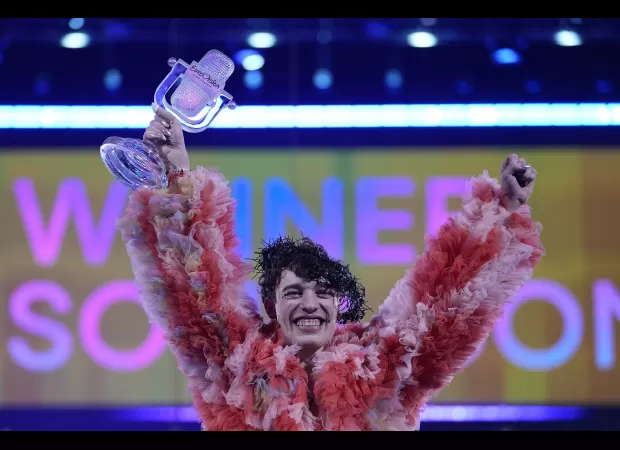Swiss singer Nemo takes home Eurovision victory.
"Swiss singer Nemo wins Eurovision with The Code, a gender identity anthem blending opera and rap."

The 68th Eurovision Song Contest was an event that captured the hearts and minds of millions, with its unique blend of music and spectacle. And this year, it was Swiss singer Nemo who emerged victorious, beating out Croatia's Baby Lasagna for the coveted title. Nemo's winning performance of "The Code" was a powerful and emotional journey that celebrated their nongender identity through a mix of operatic pop and rap.
As the results were announced, Nemo graciously thanked everyone involved, expressing their hope that the Eurovision Song Contest would continue to be a beacon of peace and dignity for all. And with this win, Nemo became the first nonbinary person to take home the title, adding to the contest's history that dates back to 1956.
But this year's contest was not without its challenges. It took place in the Swedish city of Malmo, which saw large street protests against Israel's participation due to the ongoing conflict in Gaza. And just hours before the final, there was even drama within the competition itself, as Dutch competitor Joost Klein was expelled for a backstage altercation that was being investigated by the police.
Despite these challenges, Nemo was able to rise above and best the other 24 talented finalists from around the world. Each contestant had just three minutes to captivate the audience with their unique blend of music and performance, ranging from rock and disco to techno and rap. And the show also featured some iconic moments, such as the digital "ABBA-tars" from the ABBA Voyage stage show and a special performance of "Waterloo" by a trio of former Eurovision winners.
But it wasn't just about the music. This year's contest also had a diverse range of themes and messages, with each performance offering something unique. From Lithuania's affable crooner to Estonia's pop-zombie folk hybrid, and from Greece's powerful pop fusion to Britain's upbeat dance track, there was something for everyone. And even Finland's Windows95man, who emerged from a giant onstage egg wearing very little clothing, added a touch of nostalgia and humor to the mix.
But amidst all the glitz and glamour, this year's Eurovision Song Contest also had a serious undertone. The ongoing conflict in Gaza and the protests surrounding Israel's participation divided opinions and overshadowed what is typically a celebration of inclusivity and diversity, with a huge LGBT following. And even as the competition was underway, thousands of pro-Palestinian demonstrators marched through the streets of Malmo, demanding a boycott of Israel and a cease-fire in the Gaza war.
And while the final was a night of celebration and joy for Nemo and their fans, it was also a tense and nerve-wracking experience for all involved. Some artists were noticeably absent from the final dress rehearsal, but they all appeared for the main event. And despite the tensions and traumas in the world, many performers used their platform to spread messages of love and unity, emphasizing the power of music to heal and bring people together.
In the end, it was Nemo's moving and powerful performance that captured the hearts of the audience and earned them the title of Eurovision Song Contest winner. And as Loreen, last year's champion, eloquently put it, the only thing that can truly heal the traumas in the world is love. And through this contest, we can come together and spread that message of love and unity, creating a community that celebrates our differences and embraces our shared humanity.






